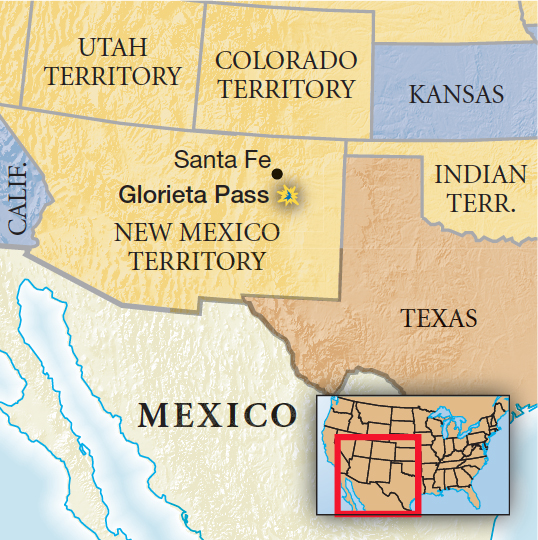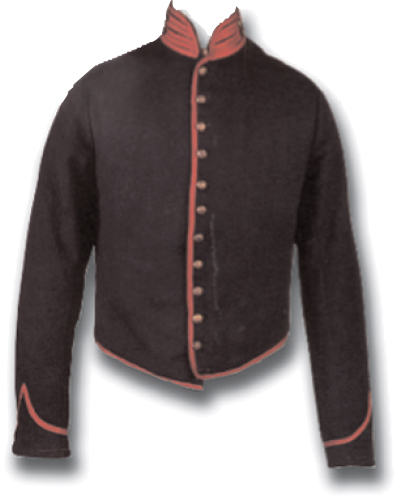Union Victories in the Western Theater.
Printed Page 397 Chapter Chronology
Union Victories in the Western Theater. While most eyes focused on events in the East, the decisive early encounters of the war were taking place between the Appalachian Mountains and the Ozarks (see Map 15.2). Confederates wanted Missouri and Kentucky, states they claimed but did not control. Federals wanted to split Arkansas, Louisiana, and Texas from the Confederacy by taking control of the Mississippi River and to occupy Tennessee, one of the Confederacy's main producers of food, mules, and iron — all vital resources.

Before Union forces could march on Tennessee, they needed to secure Missouri to the west. Union troops swept across Missouri to the border of Arkansas, where in March 1862 they encountered a 16,000-man Confederate army, which included three regiments of Indians from the so-called Five Civilized Tribes — the Choctaw, Chickasaw, Creek, Seminole, and Cherokee. The Union victory at the battle of Pea Ridge left Missouri free of Confederate troops, but guerrilla bands led by the notorious William Clarke Quantrill and "Bloody Bill" Anderson burned, tortured, scalped, and murdered Union civilians and soldiers until the final year of the war.
Even farther west, Confederate armies sought to fulfill Jefferson Davis's vision of a slaveholding empire stretching all the way to the Pacific. Both sides recognized the immense value of the gold and silver mines of California, Nevada, and Colorado. And both sides bolstered their armies in the Southwest with Mexican Americans. A quick strike by Texas troops took Santa Fe, New Mexico, in the winter of 1861–62. Then in March 1862, a band of Colorado miners ambushed and crushed southern forces at Glorieta Pass, outside Santa Fe, effectively ending dreams of a Confederate empire beyond Texas.

The principal western battles took place in Tennessee, where General Ulysses S. Grant emerged as the key northern commander. Grant, a West Point graduate who served in Mexico, was a thirty-nine-year-old dry-goods clerk in Galena, Illinois, when the war began. Gentle at home, he became pugnacious on the battlefield. "The art of war is simple," he said. "Find out where your enemy is, get at him as soon as you can and strike him as hard as you can, and keep moving on." Grant's philosophy of war as attrition would take a huge toll in human life, but it played to the North's superiority in manpower. Later, to critics who wanted the president to sack Grant because of his drinking, Lincoln would say, "I can't spare this man. He fights."
In February 1862, operating in tandem with U.S. Navy gunboats, Grant captured Fort Henry on the Tennessee River and Fort Donelson on the Cumberland (see Map 15.2). Defeat forced the Confederates to withdraw from all of Kentucky and most of Tennessee, but Grant followed.
On April 6, General Albert Sidney Johnston's army surprised Grant at Shiloh Church in Tennessee. Union troops were badly mauled the first day, but Grant remained cool and brought up reinforcements throughout the night. The next morning, the Union army counterattacked, driving the Confederates before it. The battle of Shiloh was terribly costly to both sides; there were 20,000 casualties, among them General Johnston. Grant later said that after Shiloh he "gave up all idea of saving the Union except by complete conquest."
battle of Shiloh
Battle at Shiloh Church, Tennessee, on April 6–7, 1862, between Albert Sidney Johnston's Confederate forces and Ulysses S. Grant's Union army. The Union army ultimately prevailed, though at great cost to both sides. Shiloh ruined the Confederacy's bid to control the war in the West.
Although no one knew it at the time, Shiloh ruined the Confederacy's bid to control the theater of operations in the West. The Yankees quickly captured the strategic town of Corinth, Mississippi; the river city of Memphis; and the South's largest city, New Orleans. By the end of 1862, the far West and most — but not all — of the Mississippi valley lay in Union hands. At the same time, the outcome of the struggle in another theater of war was also becoming clearer.